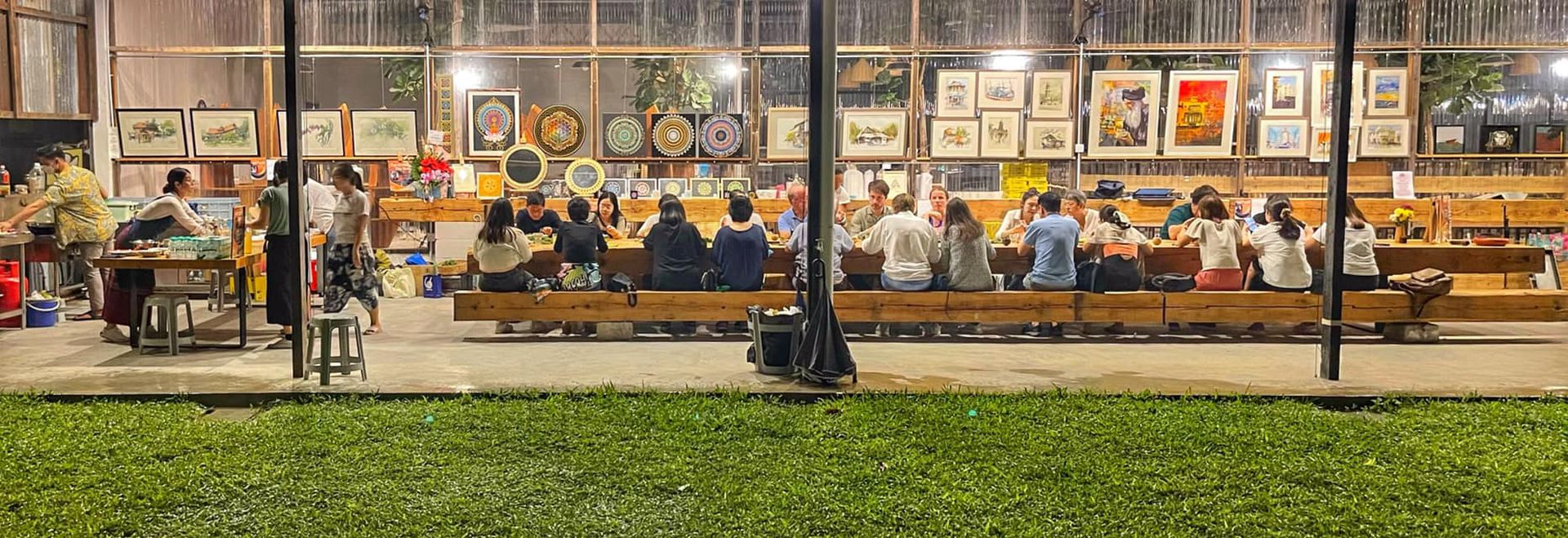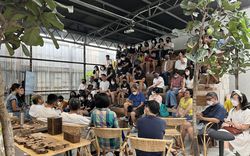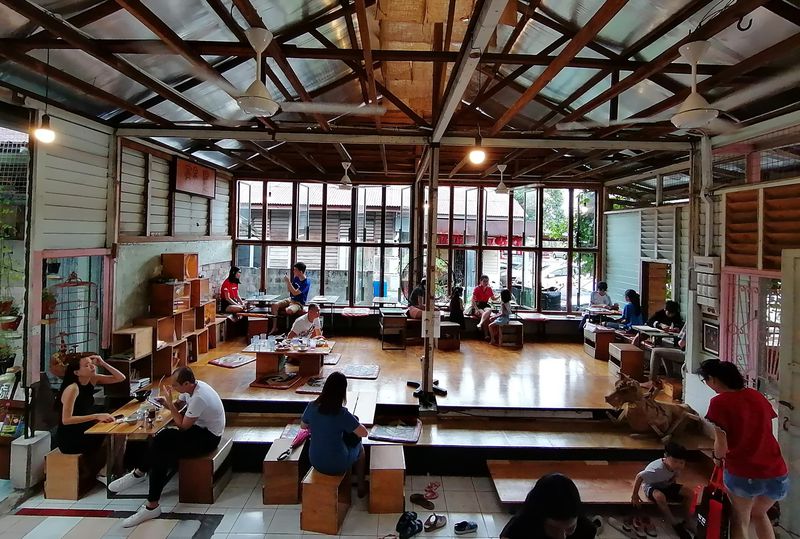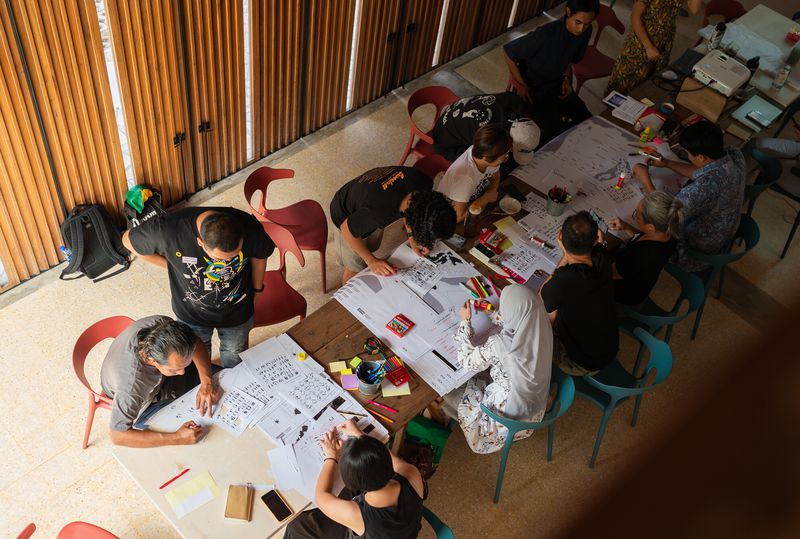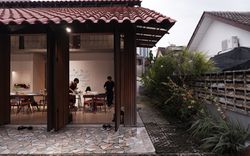This project, by the CCA’s 2022-2023 Emerging Curator Clarissa Lim Kye Lee, engages with collectives in the Malay Archipelago with aims of developing a shared toolkit for art and cultural workers globally. Through a series of workshops held in Kuala Lumpur, Malaysia in 2024, this project looks to Malaysian collective ecologies and their relationship to their urban environments for ways to reinscribe a concern for the social in contemporary art and architecture.
In the Malay Archipelago, finding a place for practice is often veiled in precarity for art and cultural collectives. Frequently conceived as a cultivation of relational practices, the social fabric holds many secret strategies that allows art and cultural collectives to find their place, renovate their place for gatherings and practices, and build relations. Making Mamak begins with the premise of two inconclusive rumours:
1) Art and cultural collectives live under the precarity of capital valued space.
2) Art and cultural collectives alternatively build a place through the care offered around friendships, kinships, and networks in new territories.
Rather than earnestly attempting to battle the globalized, capital-driven art world, art and cultural collectives in Malaysia turn to organize in and with communities. By finding and transforming found spaces, collectives adopt tactics to tackle disguised social movements, develop new forms of art production, and transform existing urban fabric to house their practices. Together, many develop a sense of gotong royong to navigate the politics of collaboration within and between collectives.
In the multiethnic, transnational capital of Kuala Lumpur—and in other urban centres of Malaysia—art collectives are housed in all kinds of architectural forms. These forms range from single-storey bungalows, or a few offices lots with adjoining spaces, to shop-lots in affluent suburban neighbourhoods. Art and cultural collectives transform these physical structures into social places, allowing for cultural exchange between different coexisting local communities. From housing interdisciplinary art performance spaces to media arts exhibition space, to an instant mamak corner for cooking and eating, gathering underpins any art and cultural collective relational practice. It is the social fabric—that selects, procures, cares for, and operates these spaces—that is currently missing in the study of art and cultural architectural discourse; a social practice developed by a regional collectivism seeping into the maintenance and care for a place.
Making Mamak is a toolkit to develop one’s own forms of collective gathering. Designed as a series of workshops for all cultural workers, social organizers, and community members, the toolkit is devised to help commit to local, community-based forms of creating and gathering. Learning from arts collectives in the urban centres of Malaysia, one can develop kinships with one’s own community, formulate mutual aid, appropriate collective spaces, and start grounded social movements.
A workshop forum that brings into dialogue the practices of diverse Malaysian art and cultural collectives, followed by a public event open to all local collectives sharing the learned knowledge, will take place on 28 April 2024. The toolkit will be activated in Montréal at the CCA in August 2024.
Clarissa Lim Kye Lee is a cultural worker based in between Hong Kong and Kuala Lumpur via Penang. She is currently a PhD Candidate at the School of Architecture and received the Hong Kong PhD Fellowship Scheme and the CUHK Vice-Chancellor’s PhD Scholarship. Working in the interstices of visual culture, arts and architecture, her research reveals the urban influence of arts collectives in Malaysia.
Her practice involves producing, curating, and navigating the internet to manage art and cultural projects. As a cultural worker, she has curated projects with the Hong Kong Arts Centre, project-managed installations for the Seoul Biennale of Architecture and Urbanism (2021), Urban and Architecture Bi-city Biennale (2015) and designed exhibitions in Berlin, Hong Kong and Vienna. Her writing and editing can be read on Design Anthology, Lensa Seni, Lanai Zine, Suburbia Projects, and more.
She was previously the Hubs for Good Scholar at the University of Malaya funded in conjunction with the British Council Malaysia to develop a report and database of over a hundred Creative Hubs in the region. She has also lectured at The University of Hong Kong, Malaysian Institute of Art, and The Chinese University of Hong Kong.
She currently lives on Lamma Island, Hong Kong, gardening with her neighbourhood dogs and community.
Clarissa has been selected as 2022-2023 Emerging Curator and will develop Making Mamak with the CCA.
Art Collectives
Papan Haus (Petaling Jaya)
Founded during the pandemic, Papanhaus is a collectively owned and run experimental cultural space in Petaling Jaya. A gathering space for cross-generational and interconnected conversations. The space is a playground, for creativity to flow and experimentation. Previously, the space has hosted workshops, exhibitions and talks about art, architecture and design.
Little Giraffe Story House (Selangor)
Rebuilt in a single-storey bungalow in Batu 11, it is a community children’s library with educational and community arts activities as a place for people to gather collectively, it also has previously been the premises for cafes, rojak stalls, community art gallery, artists studios, office and a loft.
Coex @Kilang Besi (Penang)
A community hub in Georgetown that offers alternative shared-spaces for cross-collaboration to celebrate the value of hands-on creation. As a platform, COEX hosts a plethora of arts organisations, independent bookstores, architecture firm and food and beverage initiatives. The platform hosts events ranging from music concerts, festivals, workshops and talks.
Kapallorek (Perak)
Kapallorek is an independent art space founded in 2014 It is a non-profit organization that serves as an alternative platform for emerging new media artists, inter-disciplinary arts, experimental artists, residency artists, and art researchers. The space hosts exhibitions, workshops, performances art, dialogues, and sharing sessions during which artists can share their creative practice with local communities.
Ruang Tamu Ekosistem / Pangrok Sulap (Sabah)
Ruang Tamu Ekosistem is a community art space in Kota Kinabalu, shared by culture, art and social organizations. The space hosts a variety events, ranging from univeristy student union gatherings, workshops, talks and artist residencies. The collective has collaborated with British Council, human rights organisations, cultural organisations and more.
Pangrok Sulap is one of the collectives of Ruang Tamu Ekosistem. They are a Malaysian collective of artists, musicians and social activists with a mission to empower rural communities and the marginalized through art. “Pangrok” is the local pronunciation of “punk rock,” and “Sulap” is a hut, or a resting place usually used by farmers in Sabah, Borneo.
